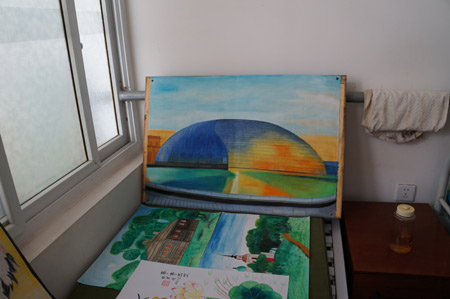Community service for psychiatric patients
- By Wu Jin
 0 Comment(s)
0 Comment(s) Print
Print E-mail China.org.cn, February 18, 2013
E-mail China.org.cn, February 18, 2013
It's not an easy task, Bai Wei, Chinese liaison officer for the project, recalled. "We are barely here for the money," she said.
 |
|
The paintings of the resident Zheng Tiejun rest at the corner of the male dormitory in Rosa Villa. [China.org.cn by Wu Jin] |
A charge of 1,500 yuan (US$240.7) a month isn't that much for a common Chinese citizen, pharmaceutical costs included, she later explained.
"Whereas to rebuild their confidence in life turns out far more significant to us," she said.
Having spent eight years living in Italy, Bai knows exactly what community recuperation means to the mentally disordered, who still often find themselves engulfed in misunderstandings and discrimination.
"Rosa Villa was first launched in a villa within an expensive community, but people said I must have been crazy to accommodate the insane in villas," Bai said sarcastically, "Some people complained that their grandchildren dare not to go out [as the patients live here]."
According to both Lorato and Bai, stigmatization remains a big hindrance for Chinese psychiatric patients to reboot their confidence in society. Yet in Italy, any random café owner might just once have been a psychiatric sufferer, said Lorato.
With Franco Basaglia's initiation in the close-down of all psychiatric patients during the 1970s, the non-custody community treatment has traveled a bumpy road as the country made strenuous efforts in tackling the problems emerging since the mandate of the Basaglia Law.





